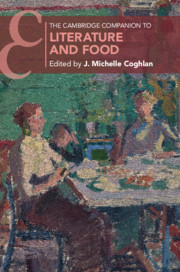Book contents
- The Cambridge Companion to Literature and Food
- The Cambridge Companion to Literature and Food
- Copyright page
- Contents
- Illustrations
- Contributors
- Acknowledgments
- Chronology of Major Works and Events
- Introduction: The Literature of Food
- 1 Medieval Feasts
- 2 The Art of Early Modern Cookery
- 3 The Romantic Revolution in Taste
- 4 The Matter of Early American Taste
- 5 The Culinary Landscape of Victorian Literature
- 6 Modernism and Gastronomy
- 7 Cold War Cooking
- 8 Farm Horror in the Twentieth Century
- 9 Queering the Cookbook
- 10 Guilty Pleasures in Children’s Literature
- 11 Postcolonial Tastes
- 12 Black Power in the Kitchen
- 13 Farmworker Activism
- 14 Digesting Asian America
- 15 Postcolonial Foodways in Contemporary African Literature
- 16 Blogging Food, Performing Gender
- Selected Guide to Further Reading
- Index
- Cambridge Companions to Literature
15 - Postcolonial Foodways in Contemporary African Literature
Published online by Cambridge University Press: 17 March 2020
- The Cambridge Companion to Literature and Food
- The Cambridge Companion to Literature and Food
- Copyright page
- Contents
- Illustrations
- Contributors
- Acknowledgments
- Chronology of Major Works and Events
- Introduction: The Literature of Food
- 1 Medieval Feasts
- 2 The Art of Early Modern Cookery
- 3 The Romantic Revolution in Taste
- 4 The Matter of Early American Taste
- 5 The Culinary Landscape of Victorian Literature
- 6 Modernism and Gastronomy
- 7 Cold War Cooking
- 8 Farm Horror in the Twentieth Century
- 9 Queering the Cookbook
- 10 Guilty Pleasures in Children’s Literature
- 11 Postcolonial Tastes
- 12 Black Power in the Kitchen
- 13 Farmworker Activism
- 14 Digesting Asian America
- 15 Postcolonial Foodways in Contemporary African Literature
- 16 Blogging Food, Performing Gender
- Selected Guide to Further Reading
- Index
- Cambridge Companions to Literature
Summary
This chapter examines contemporary African fiction through the lens of food and foodways, highlighting the ways that recent writers have deployed agriculture, cooking, and eating to highlight the traumas of history, the emptiness of displacement, and the power of community. In We Need New Names (2013) NoViolet Bulawayo uses a piece of half-eaten discarded pizza to indicate the cultural and economic distance between those Zimbabweans with access to America and Europe and those without. Rosa’s District 6 (2004) by Rozena Maart shows the way food acts to bring people of different faiths and races together in a community facing erasure under apartheid. In Aminatta Forna’s Ancestor Stones (2006), the revival of a coffee plantation serves as a metaphor for the rebuilding of Sierra Leone after decades of military coups and a civil war. In all three novels, food is used to chart political and social history unique to each region. Foodways and food security can serve as important markers in ascertaining how liberation is proceeding because access to food is a basic human necessity and foodways serve as cultural and social markers that speak to a community’s comfort with its access to food.
Keywords
- Type
- Chapter
- Information
- The Cambridge Companion to Literature and Food , pp. 228 - 242Publisher: Cambridge University PressPrint publication year: 2020

